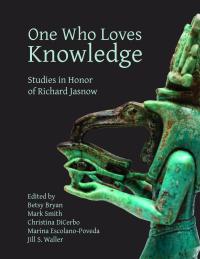One Who Loves Knowledge: Studies in Honor of Richard Jasnow
Synopsis
The thirty-nine articles in this volume, One Who Loves Knowledge, have been contributed by colleagues, students, friends, and family in honor of Richard Jasnow, professor of Egyptology at Johns Hopkins University. Despite his claiming to be "just a demoticist," Richard Jasnow's research interests and specialties are broad, spanning religious and historical topics, along with new editions of demotic texts, including most particularly the Book of Thoth. A number of the authors demonstrate their appreciation for Jasnow's contributions to the understanding of this difficult text. The volume also includes other studies on literature, Ptolemaic history, and even the god Thoth himself, and features detailed images and abundant hieroglyphic, hieratic, demotic, Coptic, and Greek texts.
Chapters
-
Front Matter
-
Book of the Dead Scholarship in Ptolemaic EgyptThe Case of pBrooklyn 37.1484E
-
Dein sei die Maat, Thot verleihe sie dir
-
A Little Thoth Goes a Long Way
-
Finding NitocrisPatterns of Female Rule at the End of Egypt's Old Kingdom
-
Epiphany or Erudition?The Inception of Atonism
-
Silent SignsDeterminatives as Markers of Scribal Knowledge
-
The First Days of School in MesopotamiaPreliminary Thoughts on the Personal Name List Inana-teš
-
L'ostracon Louvre E 11037Une lettre à un mort en démotique?
-
Some Observations on the Demotic Lease P. Tebtynis dem. 5944
-
A Demotic Administrative Papyrus from the Tuna el-Gebel Necropolis (P. el-Ashmunein Magazine Inv. No. 1455-B)
-
"Black Is Her Hair, More Than the Black of the Night"The Tale of the Herdsman and the Origins of Egyptian Love Poetry
-
Making an ImpressionHow to Seal an Ur III Period Administrative Tablet in Nippur
-
Göttlich, nicht königlichEin neuer Thot-Hymnus aus Deir el-Medineh
-
Black Spread over Mummy Cases and Tomb Walls in Dra Abu el-Naga
-
Funerary Shrouds from Dendera in the Oriental Institute Museum of the University of Chicago, Part IIShroud OIM E4789
-
Anmerkungen zu P. Loeb 2
-
A Statue of Ptah-Sokar-Osiris in the Archaeological Collection of the Johns Hopkins University
-
Richard at the Well
-
Idrimi's Aunts at EmarOn Line 5 of the Idrimi Inscription
-
Gift Giving, Generosity, and the Etymology of Manna
-
Papyrus Berlin P. 7056Division of a Kleros between Members of a Priestly Family from Roman Soknopaiou Nesos
-
Speaking Clearly through the Canaanite Amarna LettersHow to Connect with an Audience in Cuneiform
-
"Let the Ibis Be Consulted"Letters Mentioning Cult Practices
-
A New Inscription from Taharqo's "Cattle Road"
-
New Studies on the Greek Version of the Demotic Myth of the Sun's Eye: An Additional Fragment (P. Vindob. G 29357) and an Analysis of the kwf/lynx-Monkey
-
Ein frühdemotischer WeisheitstextPapyrus Berlin 23504
-
Jubilating Baboons and the Bes Pantheos
-
Notes on the Copenhagen Hawara Papyri
-
Defining the ḫꜣ n ṯꜣtyOr, Where Did the Vizier Conduct His Work?
-
Some Egyptian-Greek Language/Script Interactions as Reflected in Magical
-
Political, Social, and Economic Aspects of Dreams in the Archive of Hor
-
A New Version of the Beginning of the Book of Traversing EternityThe Hieroglyphic-Demotic Funerary Stela of Pakhom, Son of Lykos, from Edfu (22 March 18 BCE)
-
Horus and Seth from North SaqqaraA Demotic Papyrus Fragment Excavated by the EES at the Sacred Animal Necropolis
-
Tabubue and the Menstrual Tabu
-
Eine pseudohieratische Gefäßinschrift der Spätzeit aus Deir el-Bahari (Kairo JE 56283)
-
The Name of the Teacher in the Ritual for Entering the Chamber of Darkness, alias "Book of Thoth"
-
Überlegungen zu einigen libyschen Personennamen
-
Jüdische Namen in einer demotischen Bier- und Weizenzuteilung aus Elephantine
-
In What Ways Do the Gods Know You?A Bilingual Letter (Cairo Mus. Inv. Nos. 10313, 10328, 30961) Revisited
-
Indexes


